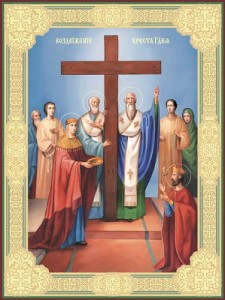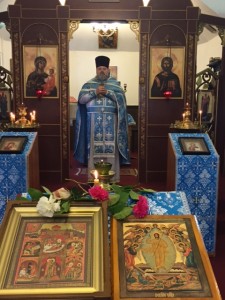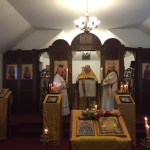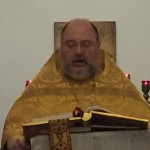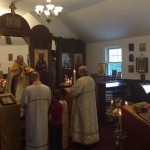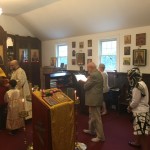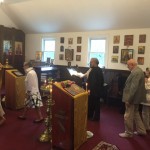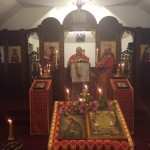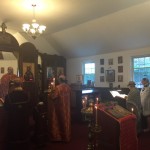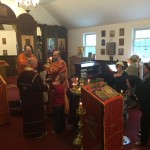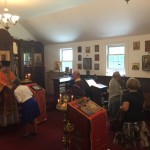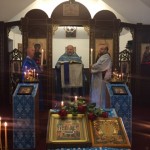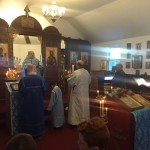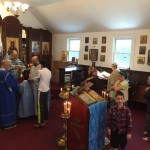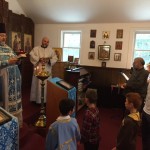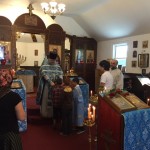On September 27 the Orthodox Church celebrates feast of the Exaltation of the Precious and Life-giving Cross. On that holy day e had a liturgical celebration in our temple. Before the reading of the Hours St. George’s Rector, Archpriest Igor Tarasov placed the cross in the middle of the church and venerated it. After the Hours he began the Divine Liturgy.
Unfortunately, during the reading of the Holy Gospel one of our parishioners, Vitaliy Malyshew, felt very ill and fainted. The Rector paused the reading but very soon was able to finish it. But the service had to be interrupted to assist the ill and to call an ambulance for him. After the ambulance took Mr. Malyshew to the hospital the Rector could resume the service of the Liturgy.
Following the Liturgy dismissal the Rector performed the rite of Glorification before the Cross singing the troparion, kontakion and magnification of the Exaltation. At the end of the celebration he preached the following homily:
“Dear brothers and sisters! Our today’s celebration was interrupted by an unfortunate incident. It happened during the reading of the Holy Gospel. And such a thing happened during such an important and holy moment not for the first time. It proves to us that the evil force exists and attacks true Christians. But, dear brothers and sisters, all the evil forces can be conquered by the power of the Precious and Life-creating Cross of Christ!
“Today’s Epistle lesson proclaims that “we preach Christ crucified, to the Jews a stumbling block and to the Greeks foolishness” (1 Cor. 1, 23). To the ancient Greco-Roman world, the Christian claim of the cross was complete foolishness. If you are familiar with Greek mythology, you remember that Greek gods could also take on human appearance. For instance, Zeus did it to chase after women, causing more harm than help. We, Christians, believe that God assumed a human body and soul, not to find pleasure but to enter into our pain. This is the mystery and the glory of the Holy Cross.”
“God enters into the depth, the pit of human experience through Jesus’ crucifixion and death. We are not alone. We wish that the Holy Cross meant that we don’t have to suffer, but it means that God chose to suffer with us. God’s ways are not our ways.”
“Therefore, dear brothers and sisters, we must always exalt and lift up the Cross of Jesus Christ. We must exalt and honor that sign of our faith, the sign of our hope and the sign of God’s love. If the Greek gods played their games with humans, the God of Jesus Christ suffered with human kind. And He suffers with us. Exalting the Precious and Life-giving Cross we should realize that God is indeed with us.”

